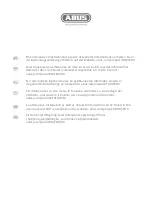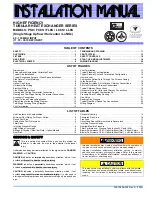
Passport 5-Lead, 5L, LT, XG Service Manual
0070-00-0420
2 - 13
Theory of Operation
Block Diagrams
The drive amplifier signal is attenuated, as discussed above, by R32 on the daughter board,
and R12 on the front end board. To restore the drive gain to a higher value, R160 has been
increased to 30.1 K. To facilitate the new lead fault detection scheme, the bias point of the
drive amplifier has been changed slightly be changing R161 and R162. The lead fault
sensing voltage arrives from the daughter board by pin 5 of the connector installed in place
of U3. The signal is buffered by voltage follower U34, and then processed by the lead fault
comparator, U24. Lead fault is indicated when this signal becomes too negative. Therefore,
the comparator, which was originally configured as a window comparator, has been
modified to detect only negative voltages. When a simulator having a connection between
the ECG and pressure is used, the lead fault voltage is driven in a positive direction, and will
therefore not indicate lead fault. The modification of the comparator consists of omitting
diode D30 and resistor R166. A noise filter has been constructed by installing a 22.1 k
resistor in place of D37, and a 0.1 uF capacitor in place of R165. The threshold voltage of
the comparator has been adjusted by changing R168 and R214. When the leads are
attached, the voltage applied to the comparator is roughly -0.4 volts. When lead fault
occurs, this voltage becomes more negative, passing the approximately -1.3 volt threshold
set by R168 and R214.
Because the lead fault is detected from the output of the lead select multiplexer, only those
leadwires actually involved in producing the displayed lead are monitored for lead fault.
Therefore, only RA, LA and LL are considered in lead I, II or III; additionally RL is considered
in aVR, aVL and aVF; and all leadwires are considered in C. However, because the aVR,
aVL, aVF and C lead selections involve averaging the voltage on two or three electrodes, the
lead fault indication is less strong on these lead selections. This is because the bias voltage of
the disconnected lead may become averaged with the voltage of a lead which is still
attached. Therefore, the lead fault comparator will see a voltage nearly equal to the negative
supply rail if a fault occurs in leads I, II or III, but will see a voltage as little as -2 volts if one
of LA, RA or LL is detached in lead C.
Summary of Contents for Passport 5-Lead
Page 1: ...Service Manual 5 Lead 5L LT XG Datascope Passport 0070 01 0420 indd 1 4 11 11 4 45 PM...
Page 2: ...5 Lead 5L LT XG Service Manual Datascope Passport 0070 02 0420 indd 1 4 11 11 4 45 PM...
Page 324: ...5 4 0070 00 0420 Passport 5 Lead 5L LT XG Service Manual This page intentionally left blank...
Page 502: ...6 100 0070 00 0420 Passport 5 Lead 5L LT XG Service Manual This page intentionally left blank...
Page 544: ...0070 00 0420 Rev T April 13 2011...
















































